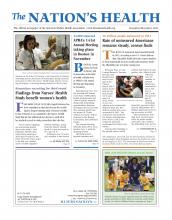People are more likely to donate money following a disaster with a higher number of deaths than number of those affected, meaning survivors could miss out on critical aid, a recent study shows.
People may be less likely to consider disaster survivors if they do not know who is receiving their donations, and the number of fatalities may seem like a more reliable tally in the wake of a disaster, said Ioannis Evangelidis, MSc, a doctoral student at Erasmus University’s Rotterdam School of Management and co-author of the study, published online September in Psychological Science.
“I can be more confident that a disaster with 1,000 people killed is different from a disaster with 1,500 people killed, but how different is 1,000 people affected (versus) 1,500 people affected?” Evangelidis told The Nation’s Health.
The study reviewed 381 natural disasters between Jan. 1, 2000, and July 31, 2011. The data found that more than $9,000 was donated for each additional fatality in a disaster, with no change in donation when it came to the survivors, based on data from the Centre for Research on the Epidemiology of Disasters and financial data from the United Nations Office for Coordination of Humanitarian Affairs.
In the study, three groups of people participated in experiments that presented a hypothetical disaster, such as an earthquake, varying numbers of fatalities and affected people. They were asked how much money they would donate. Overall, participants said they would donate more money in disasters where there were a higher number of fatalities than survivors.
In another experiment, half of the participants were asked to ranked two earthquakes — one with less fatalities and more affected people, and vice versa — before receiving a hypothetical disaster scenario. The result was 66.7 percent of participants that said more money should go toward the disaster with the most affected people and the least number of fatalities. A subsequent experiment showed participants were likely to donate more money to disaster survivors if they were described as “homeless” instead of the “affected.”
Evangelidis said the results show that detailed information about who is affected in a disaster and how are important to donation decisions.
Because the public health community’s response to a disaster will be tailored to specific needs, such as who is injured or homeless, then potential donors should be given specific numbers on how many people need medication or food, he said. Disaster donation campaign managers and policymakers should also make sure to focus more on the number of affected people, rather than fatalities, he said.
“For example, (say) ‘Every time you make a donation, think how many people are going to receive food, medication, shelter,’” Evangelidis said. “The more people realize that their money goes to survivors in need, the more likely they are to use that information.”
For more information on the study, visit http://pss.sagepub.com/content/early/2013/09/19/0956797613490748.full.
- Copyright The Nation’s Health, American Public Health Association









